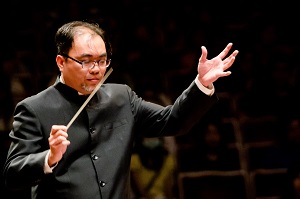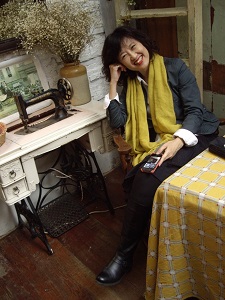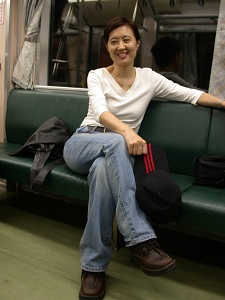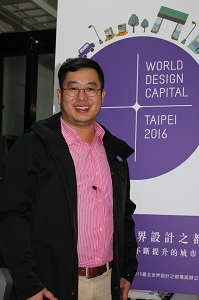DCA announces three new appointments
By Yali Chen A total of 7 candidates applied for the position of the Taipei-based TCO, the DCA said, adding that after the qualification examination and public selection process, three finalists were recommended for a job interview with the city mayor Ko. Meanwhile, three candidates applied for the post of the Taipei-based TFAM, but only one finalist passed the selection process. A total of 37 candidates applied for the position of Promotion Office for Taipei WDC 2016 Project. Wu eventually stood out from other candidates to serve as the new executive director of Promotion Office for Taipei WDC 2016 Project. Cheng is one of the Taiwan's best-known conductors and an associate professor at the Department of Chinese Music for Chinese Culture University in Taipei. Born in Kaohsiung in 1972, he learned to play the piano and violin in childhood. The distinguished musician not only received music education on the island, but also graduated from the National Taiwan University of Arts with a master's degree in conducting. Between 2003 and 2004, Cheng was assistant conductor with the Taipei Symphony Orchestra (TSO), taking charge of daily rehearsals and accumulating a lot of practical experience. His conducting skills and efficient rehearsals were popular among the Taipei-based TSO members. Celebrating the 35th anniversary of its establishment, the TSO released an album, titled Festival Overture, in December 2004 under the baton of Cheng and Amy Chang. The repertoire includes Dmitry Shostakovich's Festival Overture Op.96, followed by Carl Maria von Weber's Der Freischutz Ouverture Op.77, Giuseppe Verdi's Preludio to Act I, from La Traviata, Mikhail Ivanovich Glinka's Russlan and Ludmilla Overture, Johannes Brahms's Academic Festival Overture, Op.80, Antonin Dvorak's Carnival Overture, Op.92, Franz von Suppe's Light Cavalry Overture, and Gioachino Rossini's William Tell Overture. In addition, Cheng also recorded two albums with Taiwan JustMusic Philharmonic Orchestra in 2008 and the National Taiwan Symphony Orchestra in 2009. His baton technique was so recognized that he was invited by many orchestras to serve as a guest conductor, including the National Taiwan Symphony Orchestra, Taipei Symphony Orchestra, Kaohsiung City Symphony Orchestra, Taipei Chinese Orchestra, Evergreen Symphony Orchestra, Taipei Philharmonic Youth Orchestra, and National Taiwan University Symphony Orchestra (NTUSO). In March 2006, Cheng attended master classes in conducting, held by Lorin Maazel – one of the most high-achieving and highly paid orchestral conductors of the past half-century. Maazel recognized Cheng's baton technique, which could be what gave him his edge in the Taiwanese conducting field. Cheng is a prominent interpreter of Western classical music, in particular opera and concertos. In 2006, he founded the GuanDu Chamber Orchestra, serving as the orchestra's director and conductor. In the same year, the experienced conductor also branched out into Chinese classical music and has performed on stage with the Taipei Chinese Orchestra in the cities of Taipei, Shanghai, Beiling and Ningbo since then. Under his leadership from now on, the Taipei-based TCO performance will be much-anticipated. Born in 1956, Lin grew up in a soldier's family. Her mother sent her to take Chinese brush painting lessons during childhood. After taking the joint college entrance exam, Lin enrolled in the Department of Fine Arts at the National Taiwan Normal University (NTNU) and embarked on her art career. She taught at a junior high school temporarily after graduation from college. In 1986, shortly after her husband went to the U.S. for advanced studies, Lin took her baby son to get together with her husband. During her stay in the U.S., she earned the first master's degree in art education and then the second in art creation because she had a strong desire for creation. However, Lin has devoted her energies to art administration and teaching since she went back to Taiwan in 1992. It seemed that she did not create her artworks any more. But actually her pieces were still seen in a wide range of solo exhibitions and joint exhibitions from 1980 until 2000. On July 2, 2012, Huang Hai-ming took the position of the TFAM director, but his tenure ended on January 31, 2015. Chiang Yu-fang took up the post as the acting director of the museum from February 2015. After nearly two months of the selection process, Lin has been appointed by the city mayor Ko as the new director of the Taipei-based TFAM. With an MBA degree of Duke University and a master's degree of the National Taiwan University, Wu Han-chung is a founder of Career for Change and a co-founder of We Create Lab. He believes that creating meaningful work will change the world. His previous work experience included Asian Development Bank, Global Heritage Fund, and Flow Inc. in Taipei. In the past, he also provided consulting services for Taichung-based Chun Shui Tang Cultural Tea House and Lavender Cottage, as well as Taipei-based Vedan Company and the National Culture and Arts Foundation. Like a social innovation evangelist, Wu has devoted his energies to promoting aesthetic economics in Taiwan and tried to strike a balance between social innovation and aesthetic management. On April 10, the city mayor Ko named him as the new executive director of Promotion Office for Taipei WDC 2016 Project, a successor to the former DCA commissioner Liou Wei-gong. Wu's leadership and performance will be much-anticipated in the future. The city government has been stepping up efforts to promote design cultures leading up to its designation as the World Design Capital in 2016 and to make the locals familiar with the importance of design in daily life. The Adaptive City concept means that despite limited resources, Taipei can maintain innovation to promote the well-being of its residents. It also aims to create a forward-looking city with design vision. Meanwhile, the official signature color of WDC Taipei 2016 includes purple, red, yellow and blue, which means vitality, cultural creativity and smart technology respectively.
STAFF WRITER The Department of Cultural Affairs (DCA) announced three new appointments on April 10. Finalized after nearly two months of the selection process and decided by Taipei City Mayor Ko Wen-je, the appointments include Cheng Li-pin, new principal of the Taipei Chinese Orchestra (TCO); Lin Ping, new director of Taipei Fine Arts Museum (TFAM); and Wu Han-chung, new executive director of Promotion Office for Taipei WDC 2016 Project.
The Department of Cultural Affairs (DCA) announced three new appointments on April 10. Finalized after nearly two months of the selection process and decided by Taipei City Mayor Ko Wen-je, the appointments include Cheng Li-pin, new principal of the Taipei Chinese Orchestra (TCO); Lin Ping, new director of Taipei Fine Arts Museum (TFAM); and Wu Han-chung, new executive director of Promotion Office for Taipei WDC 2016 Project. Lin Ping is a professor at the Department of Fine Arts for Tunghai University in Taichung. In 1990 and 1992, she earned two master's degrees in art education and art creation from University of Cincinnati in Ohio. Her research explores art administration and management, curatorial science and independent curator, museum studies, art education, and art creation.
Lin Ping is a professor at the Department of Fine Arts for Tunghai University in Taichung. In 1990 and 1992, she earned two master's degrees in art education and art creation from University of Cincinnati in Ohio. Her research explores art administration and management, curatorial science and independent curator, museum studies, art education, and art creation. Apart from art administration and teaching, Lin also worked as an art curator, art critic and writer. Between 1993 and 1995, she served as the head of the curatorial division at the Taipei Fine Arts Museum. This work experience proves that she is no stranger to the operation of the Taipei-based museum.
Apart from art administration and teaching, Lin also worked as an art curator, art critic and writer. Between 1993 and 1995, she served as the head of the curatorial division at the Taipei Fine Arts Museum. This work experience proves that she is no stranger to the operation of the Taipei-based museum. On November 19, 2013, the International Council of Societies of Industrial Design (Icsid) announced the appointment of the World Design Capital 2016 designation to Taipei – the fifth city to receive the accolade following Torino (2008), Seoul (2010), Helsinki (2012), and Cape Town (2014). Under the theme "Adaptive City – Design in Motion," Taipei plans to combine its rich history, culture, creativity and city management, demonstrating why cities must adapt to meet their citizens' demands.
On November 19, 2013, the International Council of Societies of Industrial Design (Icsid) announced the appointment of the World Design Capital 2016 designation to Taipei – the fifth city to receive the accolade following Torino (2008), Seoul (2010), Helsinki (2012), and Cape Town (2014). Under the theme "Adaptive City – Design in Motion," Taipei plans to combine its rich history, culture, creativity and city management, demonstrating why cities must adapt to meet their citizens' demands.

![Taiwan.gov.tw [ open a new window]](/images/egov.png)
